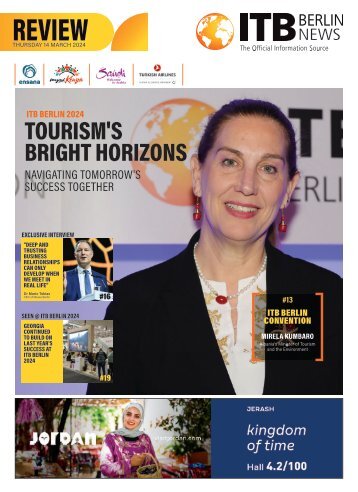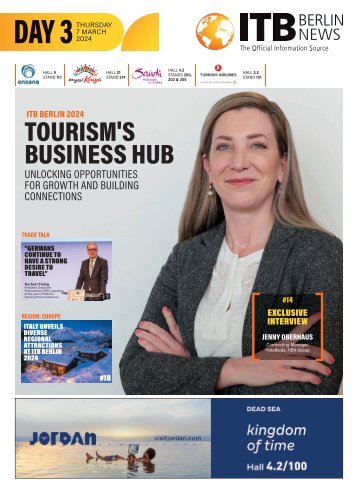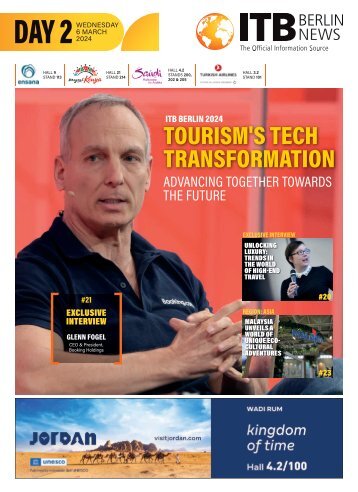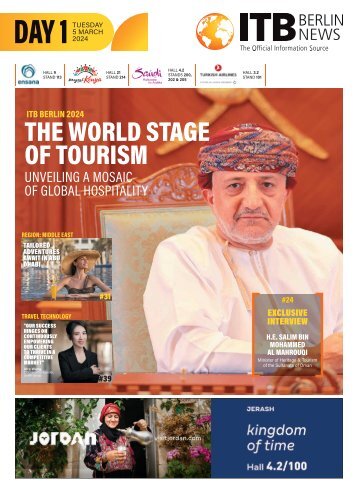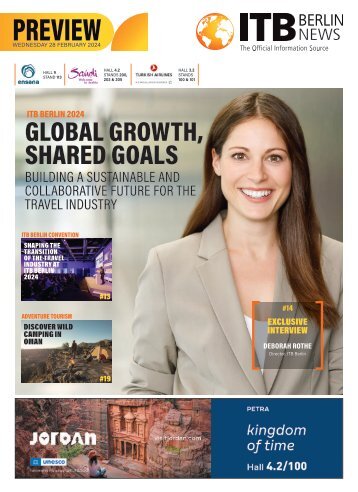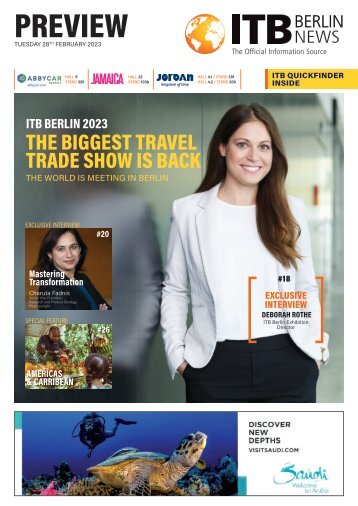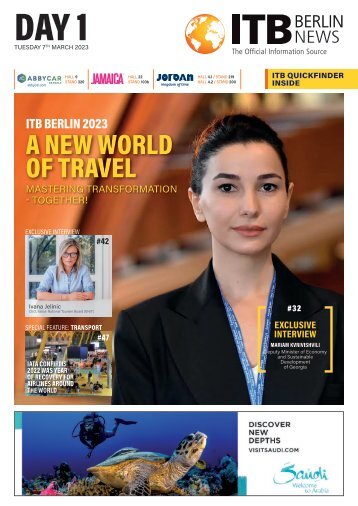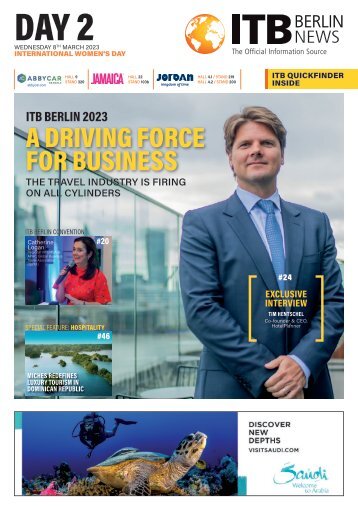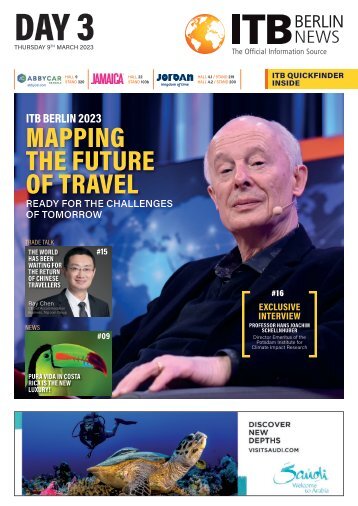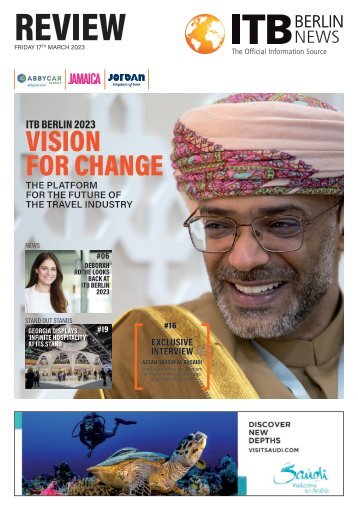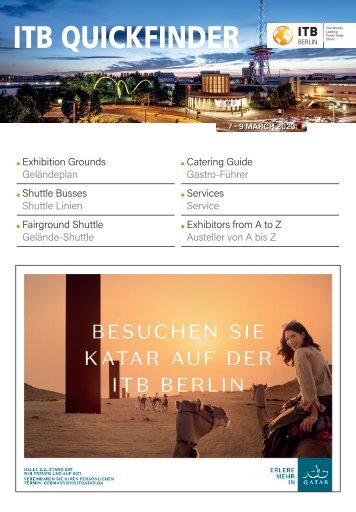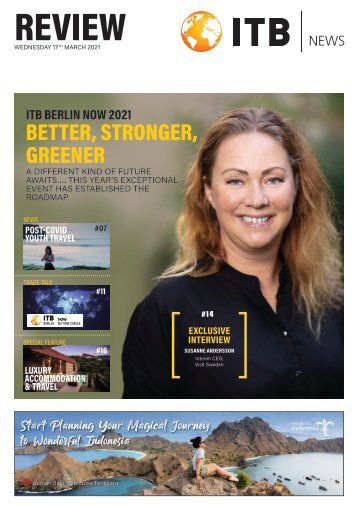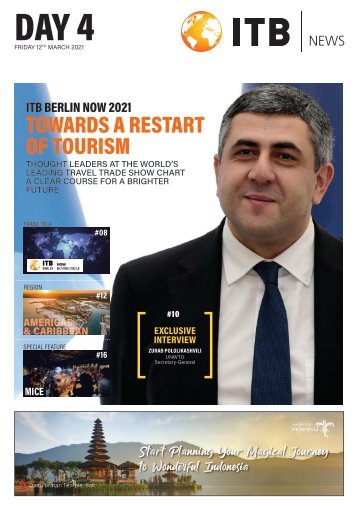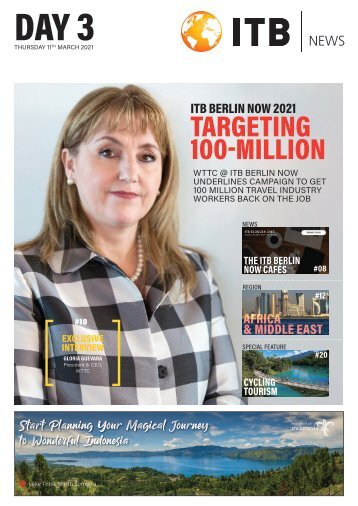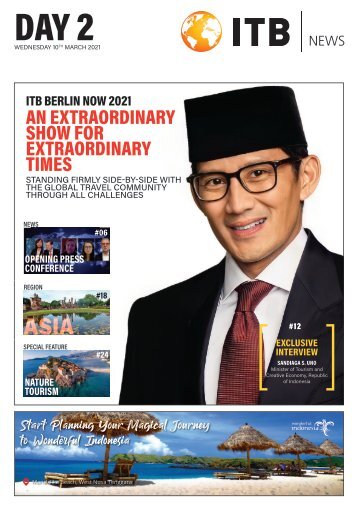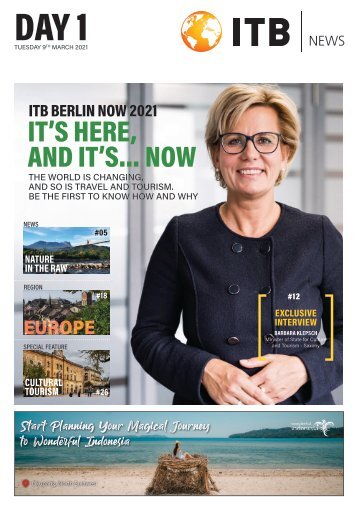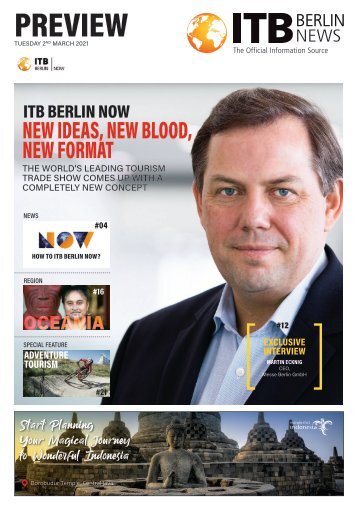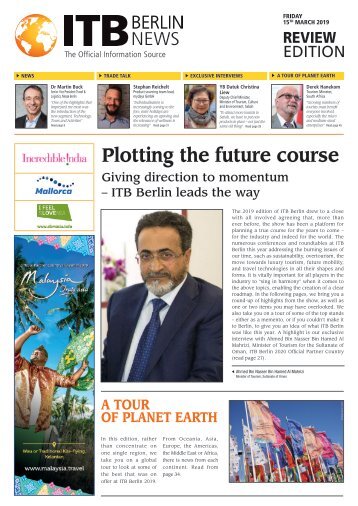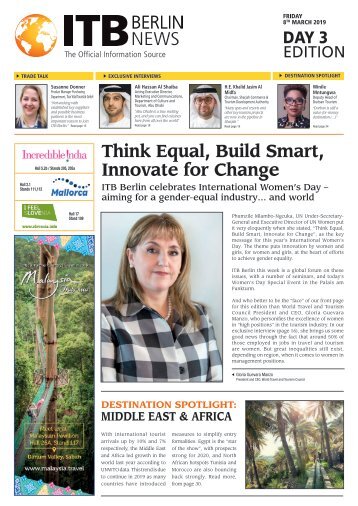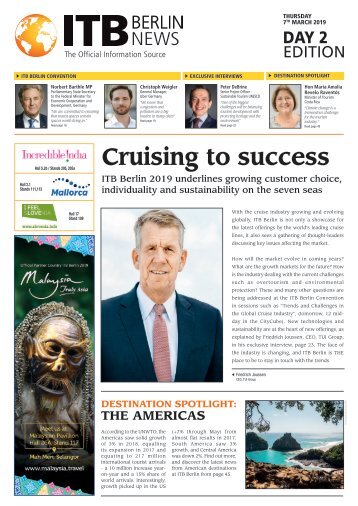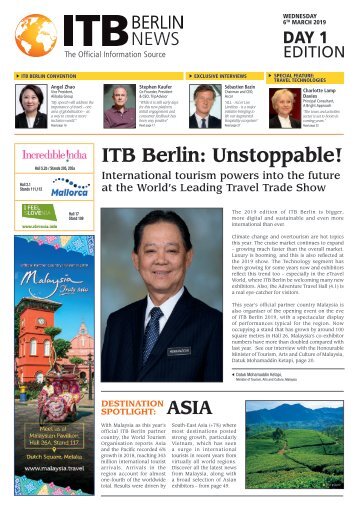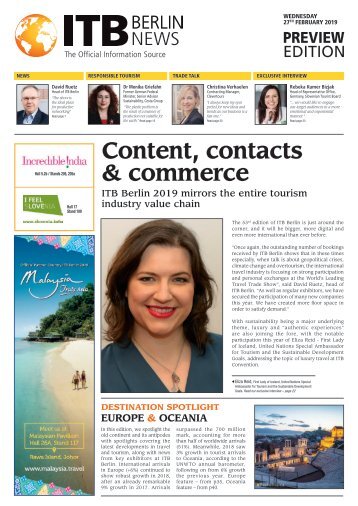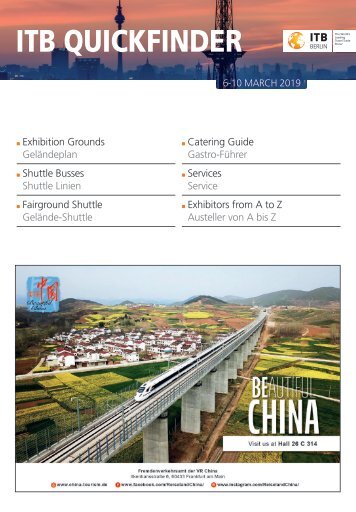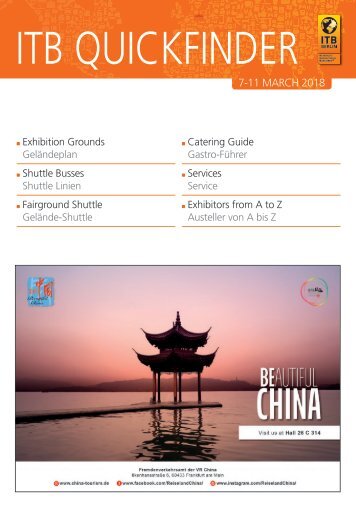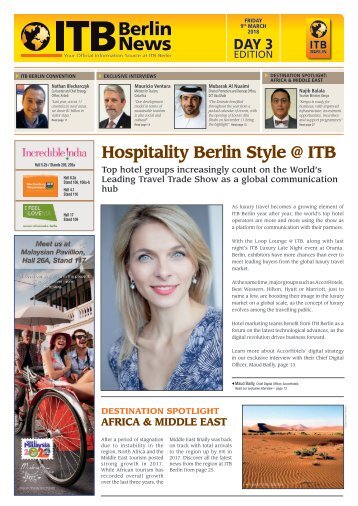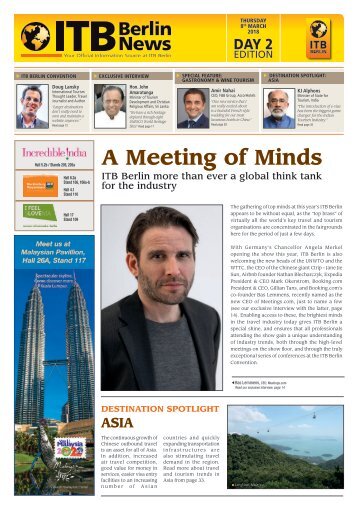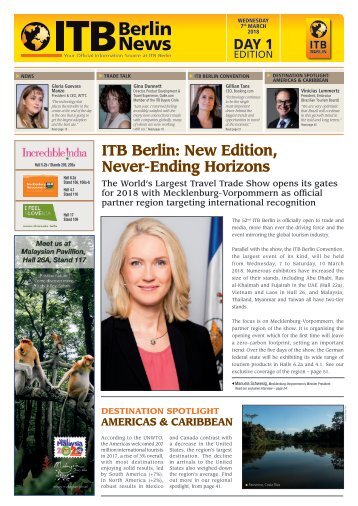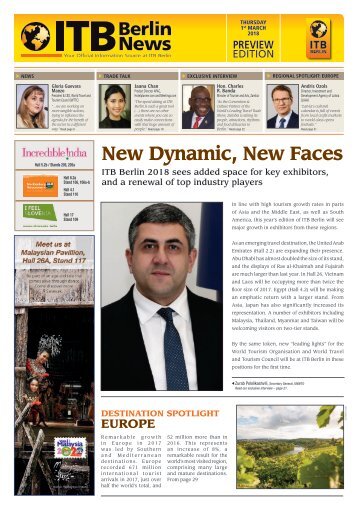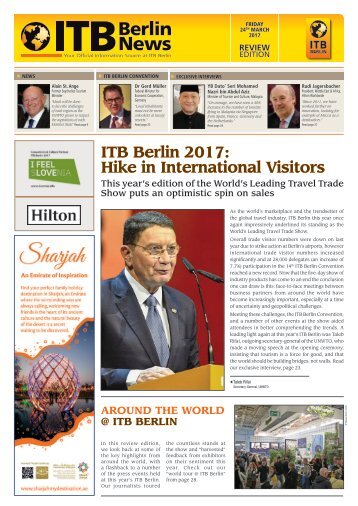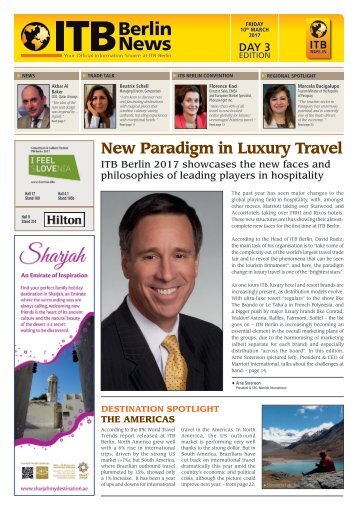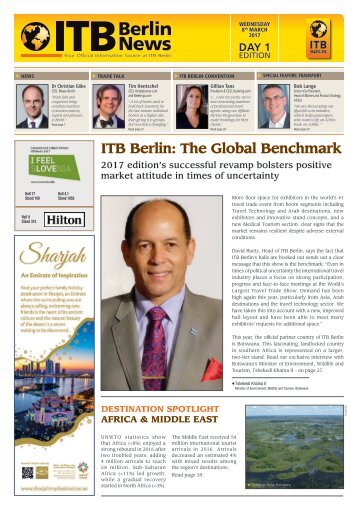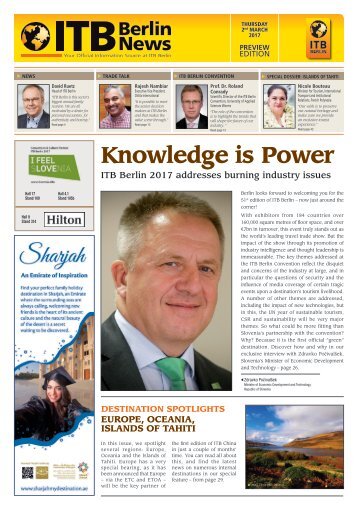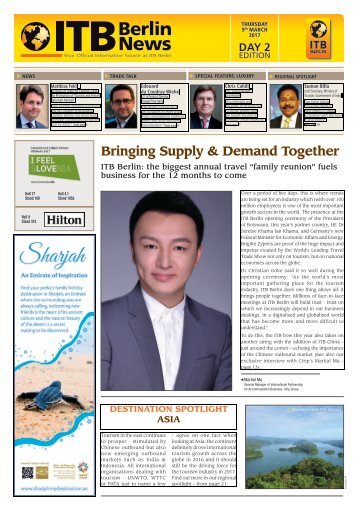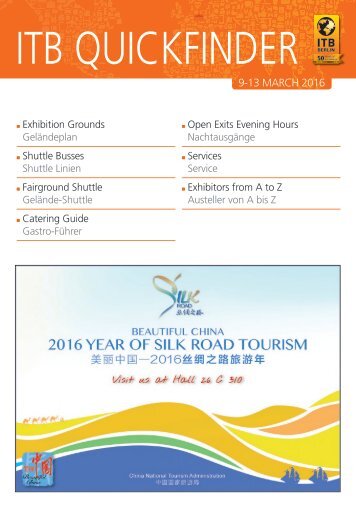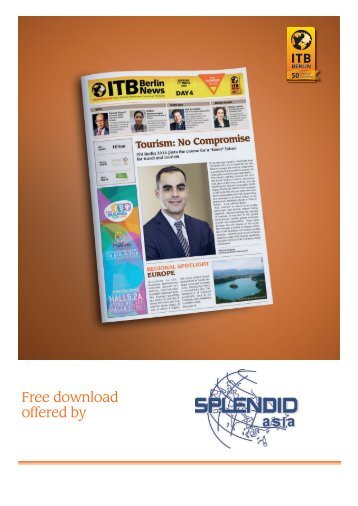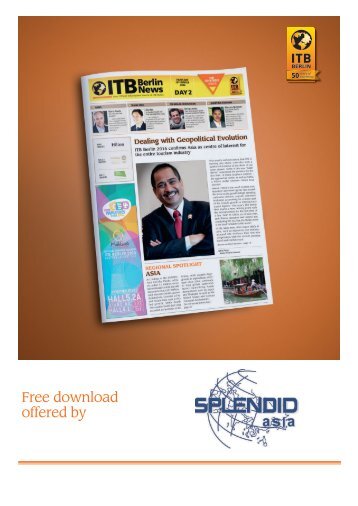
ITB Berlin News Preview Edition
- Text
- Tourism
- Hotels
- Resort
- Tours
- Berlin
- Resorts
- Exhibitors
- Halle
- Tourismus
- Marketing
- Preview
10 NEWS Key Issues at
10 NEWS Key Issues at Stake in 2016 WTTC adds political weight to the voice of the private sector The role of the World Travel and Tourism Council continues to grow in importance as the industry faces numerous challenges on a global scale. We asked CEO & President David Scowsill what he sees as being the key stakes as we head into ITB Berlin. The Travel & Tourism sector is currently being challenged by a variety of external influences, of which currently the most dominant are the threat of terrorism and the Zika virus. We remain incredibly resilient in these adverse situations, as business and leisure customers continue to travel. Despite these challenges, our latest Autumn Update shows that Travel & Tourism’s total contribution to the world economy last year was US.8 trillion and with the sector supporting 284 million jobs across the globe. What should the industry be doing to manage these issues? With the Zika virus, it is important for the sector to continue to monitor the medical developments. The World Health Organisation does not recommend any travel or trade restrictions, which reflects the advice that we are giving to travel and tourism companies. It is critical for governments, tourism bodies and companies to communicate clearly on the situation at all times, particularly with the potential concerns for pregnant women. Terrorism is a global threat, which strikes particular cities and countries with increasing regularity. The biggest threat to the industry is not the terrorist threat per se, but the possible over reaction from governments in closing their borders. Many attacks are perpetrated by “home grown” terrorists, so the solution is not as simple as removing visa waiver programmes and other mechanisms. The answer to terrorism lies in strengthening security and ensuring safety in each country, encouraging intelligence sharing and increasing the electronic processing of visas away from the current manual mechanisms in many countries. On the positive side, a number of countries have been easing visa requirements. What are your thoughts here? WTTC encourages governments to make it easier and simpler for people to travel. According to UNWTO’s latest Visa Openness Report, 61% of the 1.2 billion international travellers in 2105 needed traditional visas, involving manual form filling and queueing at consulates. Not only are Trusted Traveller, Visas Waiver and Electronic Visas more customer friendly, they are much more secure. We need governments to move faster towards electronic visa processing, in the same way that airlines switched from paper to electronic tickets. Please tell us more about WTTC’s sustainability initiatives. WTTC’s Tourism for Tomorrow strategy looks at balancing the growth of the Travel & Tourism sector with the preservation of local communities, environment and cultural heritage. As part of the strategy we organise the Tourism for Tomorrow Awards, a prestigious programme that celebrates business leadership in the future of sustainable tourism. The 2016 Awards WE NEED GOVERNMENTS TO MOVE FASTER TOWARDS ELECTRONIC VISA PROCESSING, IN THE SAME WAY THAT AIRLINES SWITCHED FROM PAPER TO ELECTRONIC TICKETS. programme has finalists of the highest-calibre. Running up to the COP21 WTTC released a study that looked at the efforts of WTTC Member companies in reducing the global carbon footprint. The report concludes that the world’s biggest Travel & Tourism companies, as represented by the Members of WTTC, are: • 20% more carbon efficient today than they were in 2005 • On course to cut CO2 emissions by 50% from 2005 to 2035 • On course to reach the target of 25% reduction by 2020. We also have recently published guidance for companies looking to report on Environmental, Social and Governance (ESG) issues. A map on our website shows where countries or stock exchanges have implemented legislation or regulations in this area. How is the role of the WTTC evolving over time? WTTC talks directly with politicians and decisionmakers speaking with the voice of the private sector. Together with the UNWTO, there have been meetings with 77 heads of state in the past 4 years. In these meetings, we are very direct in educating these leaders about the importance of the industry and what specifically their governments can do to secure jobs and growth. Through constant close interaction with our Member companies, through appointed advisors, David Scowsill CEO & President, World Travel and Tourism Council task forces and meetings with the Members we are able to reflect the most pressing issues in the sector and address those when speaking to government officials. One key message from the Council is that tourism companies and bodies must be included in policy discussions at government level, whether on long term infrastructure development, investment in people or response to disasters. Whilst the sector is facing such key challenges as the threat of terrorist attacks, it is key that government officials consult the players from within the different industries in our sector, to plan for any disruption and to mitigate the risks. It means constantly strengthening security, whilst still automating visas and facilitating travel for business and leisure purposes. ITB BERLIN NEWS • Tuesday 1 st March 2016 www.itb-berlin-news.com
NEWS 11 German Tourism Market on Rise Exotic destinations and Mediterranean countries experience boom in 2015 In 2015, exotic destinations were in high demand with German travellers. The number of long-haul travellers rose to more than five and half million - a high double-digit increase, bringing the proportion of long-haul destinations in the overall tourism market from 7.6 to almost eight percent. According to the German Travel Association (DRV), tour operators’ sales revenues were up between three and four percent. Sales revenues generated by tour operators thereby increased by approx. one billion euros to a total of more than 27 billion euros. The number of travellers on organized tours has again slightly risen - by almost one percent. “This shows a continuing high demand for travel organized by tour operators”, said DRV President Norbert Fiebig. “The German travel industry is looking back on a very satisfactory year, CARIBBEAN DESTINATIONS, IN PARTICULAR CUBA WITH A JUMP IN SALES REVENUE OF 25%, AS WELL AS THE DOMINICAN REPUBLIC AND MEXICO ARE AMONG THE WINNERS even if political situations in some destinations were difficult and the high US Dollar exchange rate posed major challenges to the industry.” The trends for the 2015 travel year at a glance, as analysed by the German market research company GfK are as follows… Caribbean destinations, in particular Cuba with a jump in sales revenue of 25%, as well as the Dominican Republic and Mexico are among the winners. The United Arab Emirates are showing a significant increase of 15% and the USA of 11%. Germans are also more attracted by Asian destinations than in the previous year, which is reflected by an increase in sales revenues generated especially in Thailand. Favourable package travel prices are cited as a major reason for the boom in exotic holiday destinations. Tour operators benefited from the early hedging of their purchases of hotel and flight contingents against exchange rate fluctuations. Numerous traditional destinations around the Mediterranean also recorded increases. Strong increases in sales revenues were recorded by Portugal with a plus of 14% and Turkey with an increase of 4%. Egypt is recording double-digit increases and the Balearic Islands’ plus is in the single-digit range. The country on the Nile is posting a substantial growth in the medium double-digit range, even if visitor numbers have not yet reached again the figure of 1.3 million guests that was reached before the Arab Spring. Greece is performing well with figures reaching again the record level of 2014. Fewer visitors than in the previous season were counted in Tunisia, the Canary Islands and the countries of sub-Saharan Africa. Southern Africa is, however, slowly recovering from the effects of the Ebola epidemic mainly responsible for these declines. On previous year’s level is the performance of destinations that can be reached by car, train or bus. German destinations are still in high demand with slight growth rates, while neighbouring countries are recording a slight decline. Trips to various European cities remain popular. The high demand for exotic dream destinations resulted in tour operator sales increases of 5% compared with last year. Medium-haul destinations, predominantly in the countries around the Mediterranean, recorded a growth in sales revenues by 3%. Turnover in the segment of the so-called earthbound destinations to be reached by train, bus or car remains constant. Cruises posted again substantial gains: According to early projections by the DRV Committee Statistics and Market Research, tour operators are expected to have generated in 2015 a high single-digit growth in sales in the sea and river cruise segment. The proportion of the total cruise business, including access and return travel, in tour operator sales has risen to about 13 percent. This means, cruises account for three billion out of the total sales of 27 billion euros, with an upward trend. If one looks at the last two decades, it is plain to see that the cruise segment has experienced a strong and steady growth. “The German sea cruise market is the fastest growing tourism market with above-average annual growth rates,” said DRV President Fiebig. © DRV Norbert Fiebig President, DRV ITB BERLIN NEWS • Tuesday 1 st March 2016
- Page 1: Free download offered by
- Page 5: NEWS 3 EDITORIAL Richard Barnes Edi
- Page 8 and 9: 6 NEWS Dr Martin Buck Senior Vice P
- Page 10 and 11: 8 NEWS ITB Berlin 2015, North Entra
- Page 14 and 15: 12 NEWS Taleb Rifai Secretary-Gener
- Page 16 and 17: 14 NEWS ADVERTORIAL Almost a Millio
- Page 18 and 19: 16 NEWS ADVERTORIAL Nusa Dua Bali V
- Page 20 and 21: ITB BERLIN NEWS • Tuesday 1 st Ma
- Page 23 and 24: TRADE TALK 21 Focusing on The Essen
- Page 25 and 26: ITB BERLIN CONVENTION 23 Plan, Comp
- Page 27 and 28: ITB BERLIN CONVENTION 25 Problems R
- Page 29 and 30: ITB BERLIN CONVENTION 27 TION PROGR
- Page 31 and 32: EXCLUSIVE INTERVIEW 29 Monster? OEC
- Page 33 and 34: HONEYMOONS SPECIAL FEATURE 31 Honey
- Page 35: HONEYMOONS SPECIAL FEATURE 33 A Hon
- Page 40 and 41: 38 SPECIAL FEATURE ADVERTORIALADVEN
- Page 42 and 43: 40 SPECIAL FEATURE ADVERTORIAL YOUT
- Page 44 and 45: 42 REGION OCEANIA SOUTH PACIFIC REG
- Page 46 and 47: 44 REGION OCEANIA Taking Fiji to th
- Page 49 and 50: © Thomas Keller HOSPITALITY / REST
- Page 53 and 54: ITB QUICKFINDER 9-13 MARCH 2016 Exh
- Page 55 and 56: Hall 26 A / Stand 106b Hall 26 A /
- Page 57 and 58: CATERING GUIDE & OPEN EXITS EVENING
- Page 59 and 60: EXHIBITORS FROM A TO Z / AUSTELLER
- Page 61 and 62: A / B EXHIBITORS / AUSSTELLER HALL
- Page 63 and 64:
B / C EXHIBITORS / AUSSTELLER HALL
- Page 65 and 66:
C / D / E EXHIBITORS / AUSSTELLER H
- Page 67 and 68:
E / F / G EXHIBITORS / AUSSTELLER H
- Page 69 and 70:
G / H / I EXHIBITORS / AUSSTELLER H
- Page 71 and 72:
I / J / K / L EXHIBITORS / AUSSTELL
- Page 73 and 74:
L / M / N EXHIBITORS / AUSSTELLER H
- Page 75 and 76:
N / O / P / Q EXHIBITORS / AUSSTELL
- Page 77 and 78:
Q / R / S EXHIBITORS / AUSSTELLER H
- Page 79 and 80:
S / T EXHIBITORS / AUSSTELLER HALL
- Page 81 and 82:
T / U / V EXHIBITORS / AUSSTELLER H
- Page 83:
V / W / X / Y / Z EXHIBITORS / AUSS
Inappropriate
Loading...
Mail this publication
Loading...
Embed
Loading...
